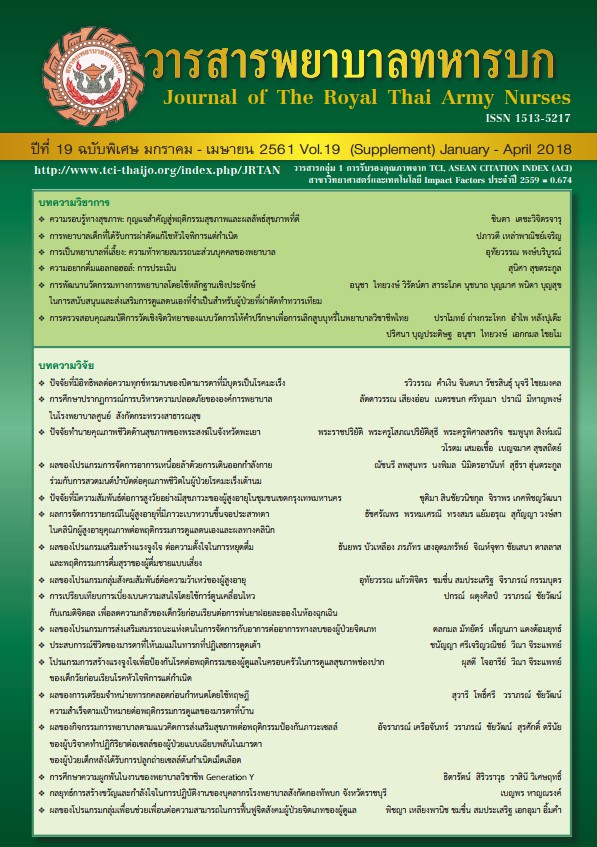The Effect Of Disease Prevention Motivation Program On Family Caregivers’ Behavior In Oral Health Care For Preschoolers With Congenital Heart Disease
Keywords:
Disease prevention motivation, Congenital heart disease, Oral health care, PreschoolersAbstract
This quasi-experimental research investigated the effect of disease prevention motivation program on family caregivers’ behavior in oral health care among preschoolers with congenital heart disease. The protective motivation theory by Rogers [1983] was applied for the program development. Subjects consisted of 44 family caregivers of the preschoolers with congenital heart disease, aged between 3-6 years admitted at an inpatient unit of two tertiary level hospitals. They were equally assigned into either the control group or the experimental group, 22 in each group. The experimental group received the motivation enhancing program for 4 weeks while the control received the conventional nursing care. Research instruments included the motivation enhancing program, the experimental monitoring questionnaire (EMS) and the family caregivers’ behavior in oral health care among preschoolers with congenital heart disease questionnaire (FCB-OHCPCHDS). Data were analyzed using descriptive statistics and t-test. The major results are as follows: 1. The mean score of family caregivers’ behavior in oral health care among preschoolers with congenital heart disease after receiving the motivation enhancing program was higher than that before receiving the program at significant level .05. 2. The mean score of family caregivers’ behavior in oral health care among preschoolers with congenital heart disease in the group receiving the motivation enhancing program was higher than that in the group receiving routine nursing care at a significant level of .05.
References
2. Weraarchakul W. Oral Health Status and Oral Health Care in Pediatric Patients with Congenital Heart Disease at Srinagarind Hospital, Khon Kaen University, Thailand. Srinagarind Medical Journal Vol.24; 2011. p.309-316. (in Thai)
3. Yoshinaga M, Niwa K, Niwa A, Ishiwada N, Takahashi H, Echigo S,Nakazawa M. Risk factors for in hospital mortality during infective endocarditis in patients with congenital heart disease. Am J Cardiol. 2008; 101: 114 -118.
4. Keadtud P. Child Care and Development unit 4. University Press Sukhothai Thammathirat Open University. Nonthaburi; 1997. p. 242-249. (in Thai)
5. Knochelmann, A., Geyer, S., and Grosser, U. Maternal understanding of infective endocarditis after hospitalization: assessing the knowledge of mothers of children with congenital heart disease and the practical implications. Pediatric cardiology 2014;35: 223-231.
6. Rogers, W. R. Cognitive and physiological process in fear appeals and attitude change: A revised theory of protection motivation. In: Cacioppo, B. L. and Pretty, L. L., editors. Social phychophysiology: A sourcebook. London UK: GUiford.; 1983. pp. 153-176.
7. Public health division, Department of Health. Mothers and children’s Oral and Oral Health Care Handbook. The Veterans Administration Printing House. Bangkok; 2008. (in Thai)
8. Queen Sirikit National Institute of Child Health. A Guide to Dental Care for Children with Congenital Heart Disease. Chulalongkorn University Press. Bangkok; 2006. (in Thai)
9. Bandura, A. Self-efficacy. In V. S. Ramachaudran (Ed.), Encyclopedia of human behavior 1994;4:71-81.
10. Itsarawat S. Teaching adults. Vol.1. Charan Sanitwong Printing. Bangkok; 2000. (in Thai)
11. Pornjindarat S. Effects of health education program on urinary tract infection preventive behavior among mothers of children with vesicoureteral reflux in queen sirikit national institute of child health. Master thesis, Health education and behavioral sciences, Faculty of Science, Mahidol University.1999 (in Thai)
12. Thipsodsong A. Knowledge, attitude and practice parents in oral health care for visually impaired children. Journal of Dentistry, Prince of Songkla University, Vol.3. Songkla; p. 1-16. (in Thai)
13. Thamkul T. Application of motivation theory to prevent tooth decay of preschool children Bythe Governor of Muang District, Nakhon Ratchasima.Master thesis, Health education and behavioral sciences, Faculty of Health Sciences, Mahidol University. 2011 (in Thai)
Downloads
Published
How to Cite
Issue
Section
License
บทความหรือข้อคิดเห็นใดใดที่ปรากฏในวารสารพยาบาลทหารบกเป็นวรรณกรรมของผู้เขียน ซึ่งบรรณาธิการหรือสมาคมพยาบาลทหารบก ไม่จำเป็นต้องเห็นด้วย
บทความที่ได้รับการตีพิมพ์เป็นลิขสิทธิ์ของวารสารพยาบาลทหารบก
The ideas and opinions expressed in the Journal of The Royal Thai Army Nurses are those of the authors and not necessarily those
of the editor or Royal Thai Army Nurses Association.





